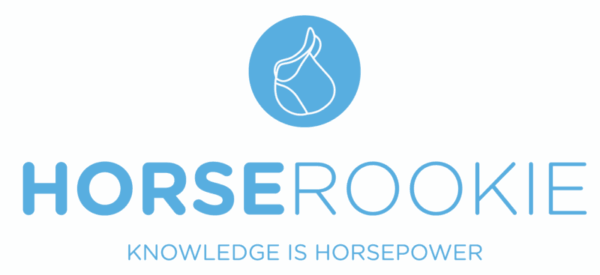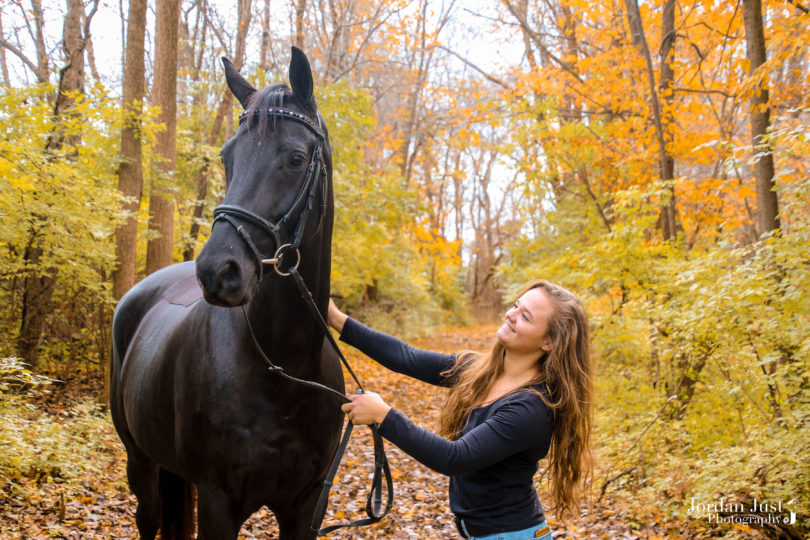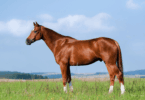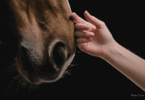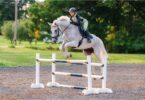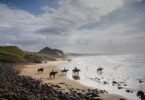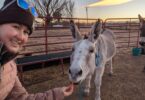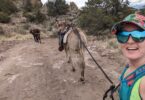College Team:University of Findlay (Learn More)
State: Ohio
Year in College: Senior
Joined Team: 2015
Riding Discipline(s): Hunter/Jumper/Dressage
About Jessie: I am a senior with a double major in English Equestrian and Equine Business Management at the University of Findlay. I am also the co-captain of the English IHSA team at UF. I am from Cedar, MI and I have been riding horses for 13 years. When I am not at the barn, I enjoy playing music, swimming, hiking, and spending time with my friends!
Collegiate Equestrian Interview
Q: What was your pre-college horse experience?
I started riding horses when I was eight after joining a local 4-H group in my hometown. I worked at a barn in exchange for lessons throughout middle/high school. During high school, I spent my summers working as a personal groom for an eventing rider in the area. I also had several different internship/working student positions at local barns in exchange for lessons and to gain more experience within the industry.
Before I came to the University of Findlay (UF), I did not have any experience showing at bigger rated shows. I mostly had experience at schooling shows and rode on my high school equestrian team. One of the things that interested me the most about UF during my college search was how the program allowed all riders, regardless of past show experience, to learn from the program and ride on the team.
At first, I felt discouraged about my lack of show experience. Once I learned more about how both the team and the program were organized, it became clear that riders with a lot of horse experience, but not necessarily show experience, are just as valuable as those who have been showing their whole life.
Q: What were equestrian team tryouts like?
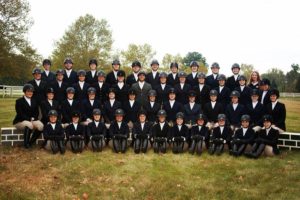
Our IHSA tryouts run exactly the same as our horse shows. Everyone fills out a placement form in order to find what division they should be in and we organize the classes accordingly. Each rider has to ride one flat class and one jumping round (if your division calls for it) and our coaches judge the class as if it were a horse show.
We usually have around 100 people tryout for the team and we accept about 40 riders. Each rider is randomly assigned to the horse that they will ride for tryouts.
Just like at a real IHSA show, the riders do not get any warm up time so it is a true test of your riding ability and evens the playing field for all riders.
Q: Describe a typical week on the team.
During the week, each rider will typically have to practice two times, one flat and one jumping. We practice in the early morning so that we can have the arena without interfering with class time at the barn. For flat practices we typically do a lot of no stirrup work, patterns, different exercises to improve our position, and end with a mock flat class. We also like to switch horses throughout practice in order to sit on as many different horses as possible in preparation for the horse shows.
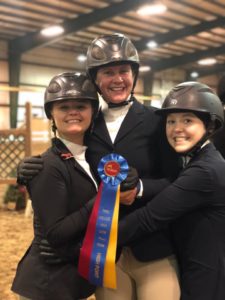 For jumping practice, we set a different course each day and we try to switch horses after each course in order to practice riding different types of horses around an equitation course. Along with practices at the barn, all of our team members workout at the gym at least three times per week. This helps our riders stay fit and riding to the best of their abilities. We also try to do some group workouts where we play games and do different team building exercises.
For jumping practice, we set a different course each day and we try to switch horses after each course in order to practice riding different types of horses around an equitation course. Along with practices at the barn, all of our team members workout at the gym at least three times per week. This helps our riders stay fit and riding to the best of their abilities. We also try to do some group workouts where we play games and do different team building exercises.
The week before a home horse show, we have practices as usual and on Friday evening, the whole team meets at the barn to clean and help set everything up. We set the course the night before so it is ready for schooling in the morning. We get our tack room organized for all the horses (usually about 90) that are being used for the show. Each member of the team has an assigned job during the horse show to ensure that everything runs smoothly.
With so many horses, and about 180 trips to the tack room, shows takes a lot of teamwork, determination, and positivity to get the job done!
Q: What type of riding did you choose and why?
I compete on the Hunt Seat IHSA team at UF, but I also ride in the
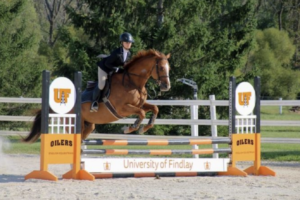 It is important to me to be a versatile rider and I am very lucky that I am able to be a part of the
It is important to me to be a versatile rider and I am very lucky that I am able to be a part of the
I chose to ride on the IHSA team, in addition, because I think focusing on equitation multiple times per week is very important for my riding.
I really like competing and being able to see my improvement over the years. Although I love competing and working to improve myself as a rider, the biggest reason I am a part of the IHSA team is because I love my teammates.
After spending countless hours together traveling to away shows, hosting home shows, in practice, and at workouts, we have all become part of a very special family. That is very unique about our program that is hard to find.
Q: What are some challenges of balancing academic and equestrian responsibilities?
One of the biggest challenges of balancing the equine program along with on-campus classes is time management. This was not one of my strongest skills when I came in as a freshman, but I learned very quickly. For the first semester it can seem overwhelming, but all the instructors, both at the barns and on campus, are understanding and willing to work with you.
One of the best ways for me to balance my schedule between my equine degree and my business degree is to make a detailed calendar and to-do list for each week. I find it very helpful to go over my plan for the next day the night before and write down everything I need to do. One of the best ways to deal with a busy schedule is being willing to work hard and efficiently when you have time to get the job done.
Being efficient and staying on top of school work is one way to greatly decrease the amount of unnecessary stress and make college a better experience overall.
Q: What’s one “rookie mistake” you made?
The biggest mistake that I have made regarding horses was not tightening my girth before mounting. After riding for a while my saddle was starting to slip all over and it made my horse very uncomfortable and unhappy. It was an oversight on my part, but it only needed to happen once in order for me to make a strict habit of checking my girth every time I get on a horse!
Q: What have horses taught you?
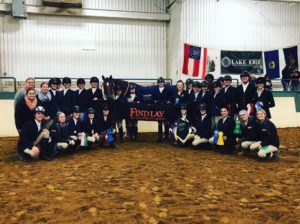 Horses have taught me countless lessons about myself, my relationships with people and other animals, and so many other skills that I learned from riding and transferred to my everyday life.
Horses have taught me countless lessons about myself, my relationships with people and other animals, and so many other skills that I learned from riding and transferred to my everyday life.
I think the most valuable lesson I have learned through riding horses would be patience. Working with horses has taught me to always give second chances and to keep my cool when things do not go exactly as planned. I think this has given me a great gift that can be hard to come by.
I have had to work with and work for a lot of different difficult people and having developed my patience over the years made it easier for me to work along side them.
Q: If you could travel back in time to your first day on the team and give yourself one piece of advice, what would it be?
My advice would be to not be so nervous. I was so worried that people would think I wasn’t good enough to be there and I doubted myself so much. I wish that I would have had more confidence in myself and my abilities. Of course, there is always room for improvement no matter what level you are at, but it is also important to be confident in the skills you do have and be willing to showcase them.
Q: Why should students join a college equestrian team?
Joining the equestrian team is a great way to stay involved with horses even if your school does not offer an equestrian program. It is also a great way to remain competitive within the sport while at school without taking time off to go travel to horse shows. It is also a way to meet people from your university that you might not ever get the chance to know. Riding on the IHSA team is also a great way to show affordably and ride all kinds of horses you might not come across normally.
[youtube https://www.youtube.com/watch?v=_LP_eipYMWw]Q: What’s one piece of gear you can’t live without?
One piece of my gear that I can’t live without would be my helmet. I have a GPA EVO that I ride in everyday and show in. It is super comfortable and looks professional for the show ring as well as for schooling. (Check out GPA helmets on Amazon.)
Q: Who is your favorite horse to ride and why?
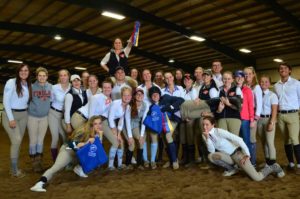 My favorite horse to ride is named Dart. He is owned by The University of Findlay and I was assigned to him last semester. Together we learned so much over just a few short months and he helped me become a more solid rider. I did not have a lot of
My favorite horse to ride is named Dart. He is owned by The University of Findlay and I was assigned to him last semester. Together we learned so much over just a few short months and he helped me become a more solid rider. I did not have a lot of
Although I have learned countless lessons from every horse at the farm, Dart taught me how to be soft, but accurate, and really helped me gain confidence in my abilities.
About the Team Shop Horse Rookie Riding Essentials Meet More StudentsEnjoy this article? Trot on over to:
- Horseback Riding in College: Tips from Alexi Neilsen
- 10 Best Stirrups for Jumping Clear (and Staying Safe)
- Shelby Dennis: Best Horse Riding Advice & Rookie Mistakes
- Horseback Riding: What to Wear (With Pictures)
- Equestrian Media Guide (Vlogs & Podcasts)
